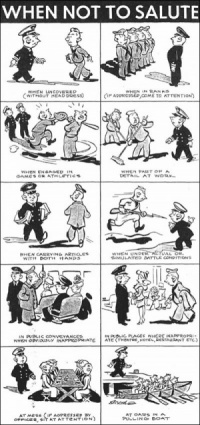How To Sol Gov Guide
This guide is to explain the new setting and thematics that are at work aboard the SEV Torch that make it starkly different from your average SS13 Server. It will go through the different ranking systems, the behavior, and the style of both the Expeditionary Corps and Military Branches aboard the ship - all part of the Sol Central Government.
The Background
The Background of the Server, and your characters, has drastically changed. Rather than throwing this at the tail end of all the information you're gonna learn today, it's best to include this at the very top. Below, you will see descriptions of the various new parts of the Sol Gov that are a part of the server - The Expeditionary Corps, The Fleet, and The Marines. Not only that, but you will see the difference in Enlisted and Officers, and the difference in age in the different Branches.
Expeditionary Corps
The Expeditionary Corps is a non-military, uniformed organization of SolGov, reporting to the Diplomacy Committee for Diplomatic Relations. It is governed by some military laws, but has its own customs, regulations, and traditions that at times put it at odd with the Defense Forces. It's considered generally to be more lax than service in the Fleet, but don't let that make you think they don't know what they're doing. Things like saluting and strict enforcement of the SCMJ are going to be alien to many of the older EC personnel, although they have used naval ranks since their inception. The focus of expeditionary personnel is on science and exploration instead of military objectives. Corpsmen are often highly specialized for the roles they take on their missions, and they are known for their experimental nature and ability to improvise. Some in the Defense Forces look at the EC as a lesser organization.
| Rank | Description |
|---|---|
| Recruit | You can't believe it has only been six months since you signed your papers. Six months of training and education to prepare you for whatever comes your way, but it feels like years. Whatever you did before, whoever you worked for, or wherever you lived, you've learned something. You took classes about navigation, xenoscience, survival, and first contact. You can salute, and don't look half bad in a uniform. Wherever you came from, you have a bit more unity with your fellow Expeditioneers. However, you're still junior, working on a government ship is strange, and a lot of the military personnel look down on you for your "soft" background. |
| Experienced Enlisted | You've just about had it with all the newbs wandering around the ship. Half of them don't know a shield generator from a shower head and haven't been on an expedition outside of simulations. They're not ready for the long haul, and in a career as dangerous as frontier exploration, that's likely to get you all killed. One way or another, they're going to have to learn, so either you'll teach them, or you'll stay out of the way when they get eaten. Better them than you! |
| New Officer | You were lucky, influential, wealthy, or experienced enough to earn a commission in the newly retooled Expeditionary Corps. The Expeditionary Academy hasn't been easy, but those at the forefront of the new exploration boom will be set for life, if they find something like Erebus. You aren't sure about all these government rules and regulations, but you think you can make a difference here, or at the very least, make some money. But don't forget - if someone paid for you to get this position, they'll be wanting something back. |
| Veteran | Things used to be done differently around here. You remember when the Expeditionary Corps meant something, when the point was the beauty and wonder of discovery itself, not to make money or find new weapons. The Corps was small, but it was a family. Now your science department is staffed by corporate peons, fleet and marines are barking orders at you and parading around with their spit shined boots. You could have given up and gotten out, but that would have been too easy. You'll be damned if the defense forces turn your boat into a battleship. |
Expeditionary Directives
The Expeditionary Corps' Directives are the cornerstone of all operations done by the organization. Each member of the Corps, and any outside personnel assisting them, are taught these directives with the expectation that they will be followed as if they are orders from Expeditionary Command itself. They are as follows:
- Exploring the unknown is your Primary Mission
- You are to look for land and resources that can be used by Humanity to advance and prosper. Explore. Document. Explain. Knowledge is the most valuable resource.
- Every member of the Expeditionary Corps is an explorer
- Some are Explorers by rank or position, but everyone has to be one when duty calls. You should always expect being assigned to an expedition if needed. You have already volunteered when you signed up.
- Danger is a part of the mission - avoid, not run away
- Keep your crew alive and hull intact, but remember - you are not here to sightsee. Dangers are obstacles to be cleared, not the roadblocks. Weigh risks carefully and keep your Primary Mission in mind.
Fleet
The oldest component of the Defence Forces, the Fleet considers itself the pinnacle of Human military accomplishment, but tends to overlook some regulations for simplicity's sake. It is well funded, but seen as complacent and bloated. Until recently the Fleet have not had a serious enemy to deal with, but is generally respected by the populace due to their work keeping away Raiders and Vox. Currently undergoing major overhauls to improve efficiency and capabilities, publicly to counter encroachment by the Terran Colonial Confederation.
| Rank | Description |
|---|---|
| Recruit | You signed on for the benefits, or maybe to serve, and now you know for sure you won't be fighting raiders or Vox, so you'll have to find a way to stay sane. All you know for sure is, after Fleet School, you're a step above all the Expeditionaries and civilians, and you're ready to get aboard your ship, even if it is a toothless corvette. |
| Experienced Enlisted | You have to remind yourself that you signed up for this when you see the condition of your new billet. While it's no ship of the line, it beats scrubbing the deck on some cruiser in Sol. At least it's like your recruiter said: "Join the Fleet, see the Galaxy." Now you're working with Expeditionaries and they seem to know far more about it than you ever did. Hopefully there's still something left to see. |
| New Officer | The best officers take the biggest challenge, or so you were told in the Academy. This expedition is going to be a hell of a challenge. You're not sure you've had enough training to deal with a department of mixed branches and civilians, but you're hoping for a chance to get your feet wet before the challenge starts. |
| Veteran | A ship like this needs a firm hand to keep in charge. One way or another, you're going to get the job done. If the civilians and Expeditionaries slow things down, you've got the Fleet and Marines to keep people in line. SolGov needs a win, and this expedition has to be that win. |
Marine Corps
Only having become a distinct organization from the Fleet in the last 60 years, the SCG Marine Corps is prideful, having history, traditions, and regulations stretching back over 400 years. Mainly equipped with hand-me-down SCG Army equipment, the Marines are considered a leaner, harder, and more cost-effective fighting force. Slowly losing the combat-experienced marines who fought on Gaia between 2550 and 2552, and growing discontent in peacetime. Generally seen as unsophisticated and lacking in strategic planning, but unrivaled in tactical ability. These are heavily based on real-world Marine Branches, not Halo Marines, or Space Marines, or ALIEN Marines.
| Rank | Description |
|---|---|
| Recruit | After three months of Boot Camp, and another three in other training units, you're a fighting machine, at least you think you are. You can shoot decently, and even though you may not have the most practical skills outside of grunt work, you're ready to do your part for Sol. Let's just hope some of these xenos act up so you can get some action. |
| Experienced Enlisted | You jumped at the opportunity to get out of the barracks and get some experience. Stand up fights are rare these days, and even though you won't be an infantry marine, it beats sitting on your ass, waiting for a war. While you never considered yourself a stickler for the regs, these scientist-types in the Expeditionary Corps don't impress you. |
| New Officer | Officer Candidate School and another year of training has you convinced you're the next hero of the SCG. While you may not be earning an honor medal on a scout ship, you could be the one that finds a major ally for SolGov, and then they can finally get back on top. |
| Veteran | It's been almost a decade since you've seen any real fighting. Dealing with raiders on the frontier doesn't come close to what you saw during the war with the Confederation. You want a little more excitement before you finish out your twenty, and this seems like a good way to get it. Rubbing shoulders with more than just the Fleet takes some getting used to, but you'll be damned if you let good order and discipline slip because the explorers can wear beards. |
The Behavior
Drill
This is made simple for the sake of not being over the top.
| Conditions | Description |
|---|---|
| The Position of Attention | The position from which all other drill is born. Head up, shoulders back, eyes straight ahead, with closed hands and closed feet. |
| Parade Rest | A less rigid position, no less sharp. Feet spread at shoulder-width apart, hands in the shape of a knife intersecting at the small of your back. |
| At Ease | Not drill per se, but related. Parade rest, but free to look around, move everything but your right foot, and keep your hands loosely behind your back. Keep your mouth shut unless you're being talked to by a superior. |
| At Rest | How everyone else is all the time. Free to move and talk. |
| The Salute | Right hand in the shape of a knife, thumb in line with your fingers, up on the brim of your headgear, or side of your head above the eyebrow, arm out straight from your shoulder. Rendered at a walk or at a standstill, never at a run. The Salute is the most important of all military courtesies. |
Courtesy
How to behave around superiors and inferiors.
| Conditions | Description |
|---|---|
| Greeting | When passing a superior Commissioned or Non-Commissioned Officer, it is customary to give them the Greeting of the Day loudly and clearly. The Greeting of the Day is Good Morning, Afternoon, or Evening, depending on the time, and the superior Officer's title. For Non-Commissioned Officers, this is "Good Morning/Afternoon/Evening (Rank) (Name)" depending on the time. For example: "Good Afternoon Staff Sergeant Schmuckatelli!" For Commissioned Officers, instead of using name and rank, only use Sir or Ma'am depending on the Officer's gender, and accompany the greeting with a salute. Address any flag officers (Generals or Admirals) with General or Admiral. Any time between 0000 and 1159 is Morning, any time between 1200 and 1659 is Afternoon, and any time between 1700 and 2359 is Evening.
When greeted, return the greeting of the day to your subordinate, if you are an officer being saluted, return the salute sharply, and drop it within a second or two. Don't salute a subordinate first. Aboard ship, while greeting, it is customary for subordinates to press to the side of a hallway at the position of attention to give superiors room to pass. |
| Saluting | Used in ceremonies, official greetings, and for reporting into superiors.
Persons Entitled to a Salute: Commissioned Officers of any Sol Central Government Organization, Warrant Officers, Commissioned Officers of Sol Central Government Member States and any Allied States. The Colors of Sol Central Government and any Sol Central Government Member State, and their respective anthems also rate a salute. When in doubt, salute, better than getting chewed out. When to Salute Off-Ship: Whenever you are outside, in uniform and covered (wearing headgear) at any time you're passing someone that rates a salute, or passing a flag,. If the formal raising or lowering of the flag, or the playing of an anthem is in progress, and you are outside, assume the position of attention, face the direction of the music/flag/both and salute, if in uniform. If a superior passes you while you are outside, be sure to salute them. When saluting a superior, do not drop your salute until they do so. Do NOT salute while seated. Do NOT salute out of uniform, inside, when on armed duty, when engaged in work, or when uncovered. When to Salute Aboard Ship: You instigate saluting a superior officer once a round for each officer.
When not to Salute:
You should salute the captain every time you are eligible to, according to the above list. |
| Addressing Superiors and Subordinates | Superiors: Similar to greetings, superior Commissioned Officers will be addressed as Sir or Ma'am, and at the position of attention unless the superior Officer tells you otherwise. Salute at the beginning and end of your conversation. Non-Commissioned Officers will be addressed by their Rank and Name, and should be spoken to at the position of Parade Rest unless told otherwise.
Subordinates: While not required, it is good practice to address subordinates by their Rank and Name if Enlisted, or by Mr. or Ms. Name if Commissioned. ' Other Courtesies:
|
| Following Orders | When to say "Yes Sir," and when to put your foot down.
The Law: SCG personnel are beholden to a few masters, but at the top of it all is the Sol Gov Military Justice, an additional set of rules, laws, and regulations that govern the behavior of SolGov Defense Forces and Expeditionary Corps. SCG personnel have a duty to obey ALL lawful orders, and a duty NOT to obey unlawful orders. But just what makes an order lawful or unlawful?
Disobeying a Command: While it may be tempting to overreact if given an unlawful order, disrespecting a superior officer will still get you thrown in the brig. The best way (and legal way for that matter) to disobey an order is, upon being given the order and deciding it is unlawful, is to clearly and respectfully tell the superior who has given that order that you cannot obey it. "Sir, I cannot in good conscience carry out that order," or "No Ma'am, I can not," are good examples of how to respectfully disobey an order. |
Uniform Wear and Standards
Every Girl crazy 'bout a sharp-dressed Man. More information about the wear of each uniform can be found here.
There are three major types of uniforms each part of the Defense Forces and Expeditionary Corps wear, each for different circumstances, the Utility Uniform, the Service Uniform, and the Dress Uniform. There are a lot of variations to these uniforms, and service-specific PT uniforms, but these are the basic three. While in uniform, you should take care of your actions, you're representing not only yourself, but your organization and your peers. Disrespecting the uniform could also violate regulations. Your uniform reflects the pride you have in yourself and your organization, keep your headgear on straight, button your buttons, shine your shoes, and keep your creases ironed. Do not smoke, chew gum, eat or drink while walking, or put your hands in your pockets while in uniform.
| Uniform | Description |
|---|---|
| Utility Uniform | Fatigues, Utes, Cammies, the Field Uniform. Worn both in the field, and while working aboard vessels, the Utility Uniform is for getting work done, and getting dirty while doing so. In the field, you can be a lot more flexible with the wear of this uniform as the mission requires. An undershirt's required color typically depends on the type of Utility Uniform. Sleeves can be rolled depending on the CO's preferences. Rank, name, and Service are indicated on this uniform, but don't go wearing any medals or ribbons other than Wings, or a branch pin, you'll look like a tool. Equipment required for a job or task can be worn freely for this, that includes anything from belts, to holsters, to vests, to hardsuits. |
| Service Uniform | The equivalent of a nice suit in a business, the Service Uniform is worn in Garrison and aboard ship during some ceremonies, or in circumstances where you won't be getting dirty. You have the opportunity to show off all the shiny ribbons and medals you've earned for your service. Authorized for wear off-duty. The only pieces equipment that can be worn with a service uniform are belts, holsters, and decorations. |
| Dress Uniform | The one in all the commercials. Very formal, should look like you've put a lot of work into looking good. Worn for formal events, visiting dignitaries, and when you want to impress that one person you've been hitting on, you know the one. Time to wear all of your awards, cords, medals, ribbons, and anything else to impress the higher-ups. Do not wear ANYTHING, while in this uniform, other than decorations or a concealed holster. Typically has a higher version called "Evening Dress," but that's uncommonly seen below flag officer ranks. |
Mannerisms
Some foibles and actions that might make you seem a bit more military.
| Conditions | Description |
|---|---|
| Respectful | Be polite, speak when spoken to, try to be the perfect gentleman or lady. You've had some discipline beaten into your thick head, might as well put it to good use. Say "Sir" or "Ma'am" when you're speaking to civilians, it's a good practice. If someone insults you, don't start a fight, just let it slide off your back. |
| Alert | Situational awareness takes a bit of work to teach, but is a valuable skill. Keep your head on a swivel, don't be complacent. Don't stand in the way, be aware of the flow of foot traffic and don't block hatches with your flabby body. |
| Thoughtful | Problem-solving is hard, but it helps to step back and look at a problem, instead of charging off to meet it head on. The sweet spot for a plan of action is somewhere around 50% of a plan. 100% takes too long, and 0% gets you and your people killed. |
| Stand Tall | You're a part of something big, be proud of it. Hold your head up high and carry yourself like you're better - in some ways, you are. |
| Directness | You've been trained to communicate quickly and effectively, say what you mean how you mean to say it, confidently. Make eye contact with whoever you're talking to, and own the conversation. |
| Teamwork | You are one moving part in a larger weapon that is your unit. Without the rest of your unit, you're nothing, and without you, your unit is nothing. Put your group before yourself, always. |
| Honor | Your word is your bond, but your actions should show even more than your words that you're reliable and trustworthy. |
| On the Other Hand | Military Service is not a magical machine that turns jerks into heroes, on the contrary, handing a bad person power might just make them worse. There are just as many liars, assholes, and idiots in the military as there are in the real world. What kind of person are you? |
| Salty Lingo | If you listen to older Enlisted, you'll hear a rough, grumbling language similar to Gutter that Non-Commissioned Officers use to express themselves. Mostly slang and half-baked analogies. e.g. "Life's like fruit loops! Dey all look different but dey taste the same!" |
Ranks of the SCG Expeditionary Corps, Fleet, and Marine Corps
A cheat sheet for finding out who is higher in rank than whom. Higher rank numbers are higher in rank. Rank numbers with multiple sub-ranks are ordered with the higher rank first, and lower ranks below. If two individuals are the same rank, position in the chain, and amount of time as that rank determines who is higher.
Allowed Ranks for Positions on the Torch
For obvious reasons, all ranks cannot play all positions. All leadership (expect SEA) must be commissioned officers; Senior roles in departments must be NCOs. Also the CO must be Expeditionary Corps and Marines cannot take on Medical Roles. All Medical Personnel are Officers, but they are Staff Officers, not Line Officers nor Bridge Officers (the difference is these last two groups are your Heads of Departments and the BOs who handle things for the CO. Don't worry, it's not as confusing as it sounds).



















































